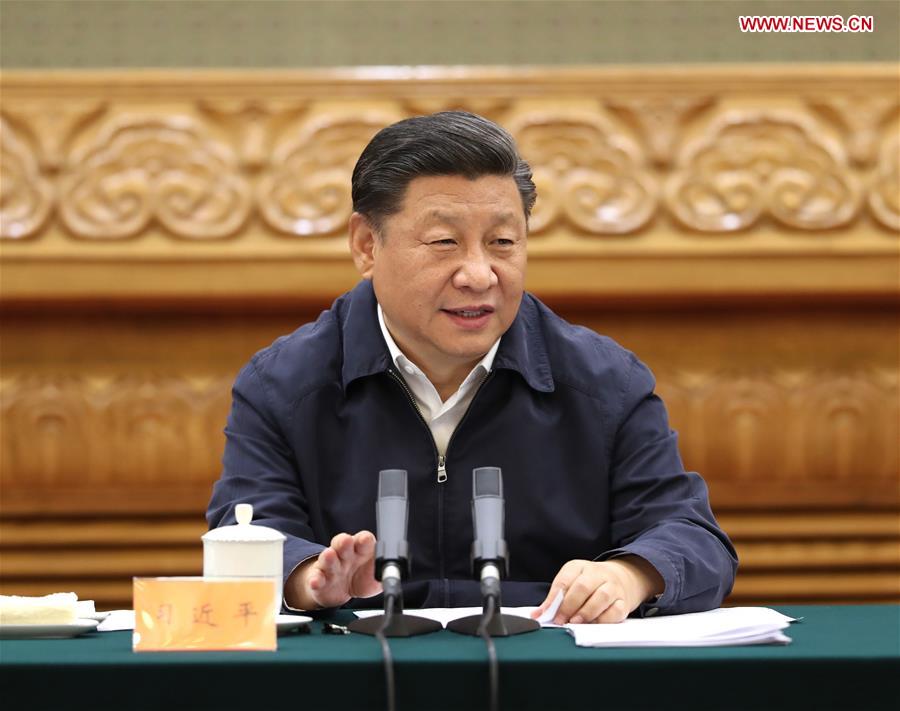
General Secretary of the Communist Party of China Central Committee Xi Jinping, also Chinese president and chairman of the Central Military Commission, delivers a speech while attending a meeting reviewing the reform of Party and state institutions in Beijing, capital of China, July 5, 2019. (Xinhua/Huang Jingwen)
BEIJING, July 5 (Xinhua) -- Xi Jinping, general secretary of the Communist Party of China (CPC) Central Committee, on Friday stressed consolidating the achievements in the reform of Party and state institutions and modernizing China's system and capacity for governance.
Xi, also Chinese president and chairman of the Central Military Commission, made the statement at a meeting reviewing the reform of Party and state institutions.
The general framework for the functional system of Party and state institutions that meets the requirements of the new era has been initially established, Xi said, noting the reform has systematically enhanced the Party's leadership, the government's administrative capacity, the armed forces' combat capability and mass organizations' vitality.
Xi urged efforts to earnestly sum up the remarkable outcomes and valuable experience in deepening the reform, consolidate the achievements, continue to improve the functional system of Party and state institutions and modernize China's system and capacity for governance.
Members of the Standing Committee of the Political Bureau of the CPC Central Committee Li Keqiang, Li Zhanshu, Wang Yang, Zhao Leji and Han Zheng attended the meeting.
Wang Huning, also a member of the Standing Committee of the Political Bureau of the CPC Central Committee, presided over the meeting.
In just over a year, the tasks of reform laid out at the third plenary session of the 19th CPC Central Committee have been accomplished on the whole, Xi said.
The CPC Central Committee's decision to deepen the reform of Party and state institutions was absolutely correct, and the organizing and implementation of the reform were resolute and efficient, Xi said, noting that it showed the political advantages originating in the Party's centralized and unified leadership and the country's socialist system.
Based on the achievements made as of now, plenty of work should be done to realize "chemical reactions," Xi stressed.
He listed several priorities for the future:
To incorporate the adjustment and optimization of Party and state institutions' functions and duties with the improvement of systems and mechanisms, and combine the development of the Party's long-term governance capacity with the upgrade of the state governance level;
To perfect the system through which the Party exercises leadership over major tasks and to strictly enforce political discipline and rules;
To enhance the coordination between Party and government institutions;
To upgrade the capacity of Party and state institutions to perform their duties;
To well motivate the central and local institutions;
To push forward the supporting reforms;
To manage the institutions in line with the law;
To enhance competence and a sense of responsibility of all institutions.
Xi said deepening the reform of Party and state institutions has been planned and advanced in the big picture of deepening reforms in all areas, and is a strategic battle of comprehensively deepening reform.
Noting that there is only about one year to go before achieving decisive results in reforms in crucial areas and key links by 2020, Xi called for continuous efforts in fighting tough battles, "cracking hard nuts" and focusing strength on making breakthroughs in this regard.
Wang Huning stressed studying and understanding Xi Jinping Thought on Socialism with Chinese Characteristics for a New Era and utilizing the favorable conditions created by the institutional reform to facilitate the implementation of various reform measures.



